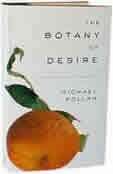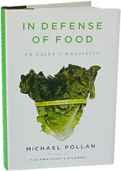Michael Pollan's
"The Botany of Desire"
and
"In Defense of Food"

I've just finished back-to-back reading of Michael Pollan's "The Botany of Desire" and "In Defense of Food."
He is gardener who writes intelligently and passionately about plants and what we are doing to them (and what we are doing to ourselves) in the name of nutrition and progress.
The book flap and reviewers of "Botany" say he tells the story of plant evolution from the plants point of view. He actually gives us the universal point of view. He looks at the actions of humans and plants, and addresses the effects of each on the other and both on the planet.
None of us really relate to plants, so Michael Pollan introduces us to species interrelationships with furry friends. Which do we admire more: the dog or the wolf? We would probably say the wolf. However, dogs have adapted to us and we to them so well that there are 50 million dogs in the US and only about 10,000 wolves. That is a successful interrelationship by anyone's standards.
I love the way he changes our perception. Did you ever think that "flowers begot us?" If flowers had not evolved from plants then mammals would not have developed and thus, no humans. What do we get from flowers and fruits? What do they get from us? The author says that we get, "nutrition exchanged for transportation."
 In a chapter where he is presumably telling us about the new, genetically modified potatoes he slips in two full pages of what is currently being added to the potatoes that we eat. I dare you to read the chemistry of potato farming and not think about what you are adding to your body next time you munch a French fry.
In a chapter where he is presumably telling us about the new, genetically modified potatoes he slips in two full pages of what is currently being added to the potatoes that we eat. I dare you to read the chemistry of potato farming and not think about what you are adding to your body next time you munch a French fry.
"In Defense of Food" takes on corporate food giants and what they are doing to "food." Or, is the author taking us to task? Why are we buying and eating imitation food?
Without using complex any nutritional matrices or mind numbing statistics, he employs common sense to point out the fallacies of our eating habits.
Pollan leaves us with very simple rules of eating. The simplest are on the cover of the book. You don't even need to read the book. Just the cover.